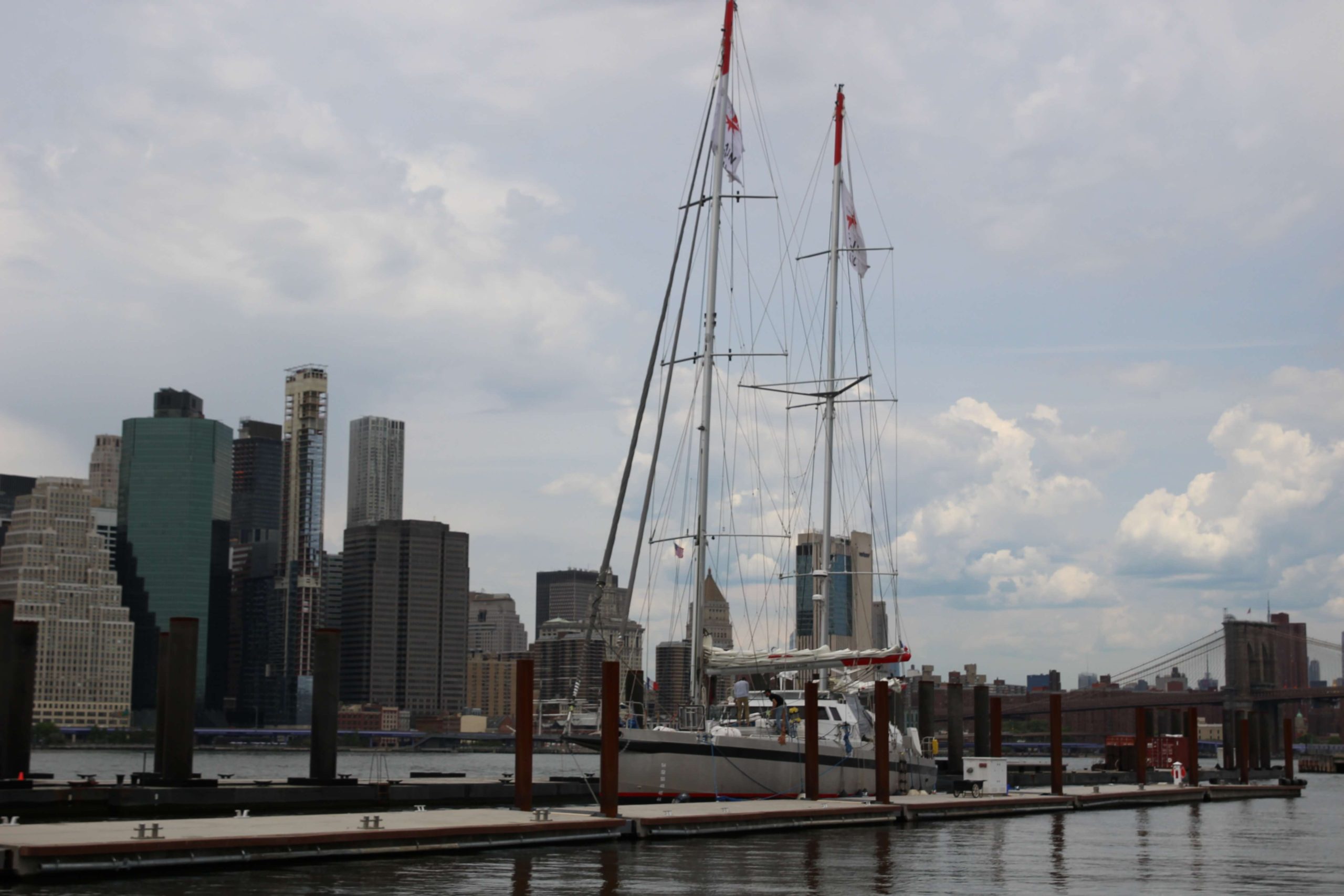As the Red Hook Star-Revue reported last month, French company Grain de Sail’s modern cargo sailboat finally docked in the Brooklyn Bridge Park marina in mid-May. The sailboat and its four crew members left Saint-Malo, France, on April 16 to embark on a three-month-long Transatlantic voyage that would make stops in New York and the Dominican Republic.
The vessel is unique because it is powered by the wind – using two wind turbines, photovoltaic panels, and hydro generators to meet its onboard energy needs and import raw materials. It cost two million Euros, or roughly $2,439,000, to build.
Grain de Sail arrived in New York City on May 13 after 27 days on the Atlantic Ocean. It brought 8,000 bottles of organic, biodynamic, and natural French wine and 500 bars of chocolate to shore.
The Red Hook Star-Revue toured the 50-ton, 72-foot-long aluminum schooner on May 16, seeing firsthand what the vessel looked like – both above and below deck – and how it was able to make its journey to the Big Apple on schedule.
[slideshow_deploy id=’13498′]
About 450 people booked tours aboard the vessel during its two-week stay in port. There, guests were able to learn more about the vessel’s advanced green transit features, as well as sip Grain de Sail’s signature wines with a slice of cheese and baguette. They were also able to take home a souvenir chocolate bar of their choosing.
Matthieu Riou, Grain de Sail’s U.S. wines & spirits director, confirmed that all 500 chocolate bar samples and about 70 bottles of wine were consumed during the stay.
The boat’s hull, which is designed for 26 pallets of cargo, was well insulated and clocked in at between 18 and 20 degrees Celsius. This temperature kept the wine at an appropriate temperature for travel, according to Riou. The pallets were also secured with hygrometry stabilization, making this sailboat the world’s first purpose-built floating wine cellar under sail.
All Grain de Sail wines were put through a “taste-resiliency test,” which involved placing bottles in cargo sailboats for at least three weeks at sea and tasting them at various intervals after they return – generally upon returning to the harbor, then one week later, and then another two weeks thereafter. Their wines also underwent malolactic fermentation, which Grain de Sail explained is a process of winemaking that is mostly used in Burgundies and Chardonnays and gives the wines a kind of creamy, buttery taste.
The sailboat left Brooklyn on May 26 and proceeded south to the Dominican Republic. Once landing there after about a week on the water, the plan was to pick up organic coffee and cocoa beans.
“This will create a virtuous circle between the Old Continent and the New,” Grain de Sail said of the three destinations slated for its most recent trip.
The last leg of the trip back home to Brittany, where chocolate and coffee are produced at the company’s factory, takes about one month. Though Grain de Sail only sells its chocolates and coffee in Brittany at the moment, plans are in the works to build more factories – including possibly a New York City chocolate factory in 10 years.
Grain de Sail is beginning to design a second cargo sailboat, which will be twice the size of the current sailboat, hold around 250 pallets of cargo, and be operational by 2023. But the ultimate goal of the company’s founders is to build a fleet of cargo sailboats to pursue the search of high-quality products within its maritime, human, and environmental adventure.
Riou told the Red Hook Star-Revue that guests are eagerly looking to buy the wines and that Grain de Sail is also looking to expand its distribution. If any wine shops, wine bars, or restaurants are interested, they can contact him directly at matthieu.riou@graindesail.com.










